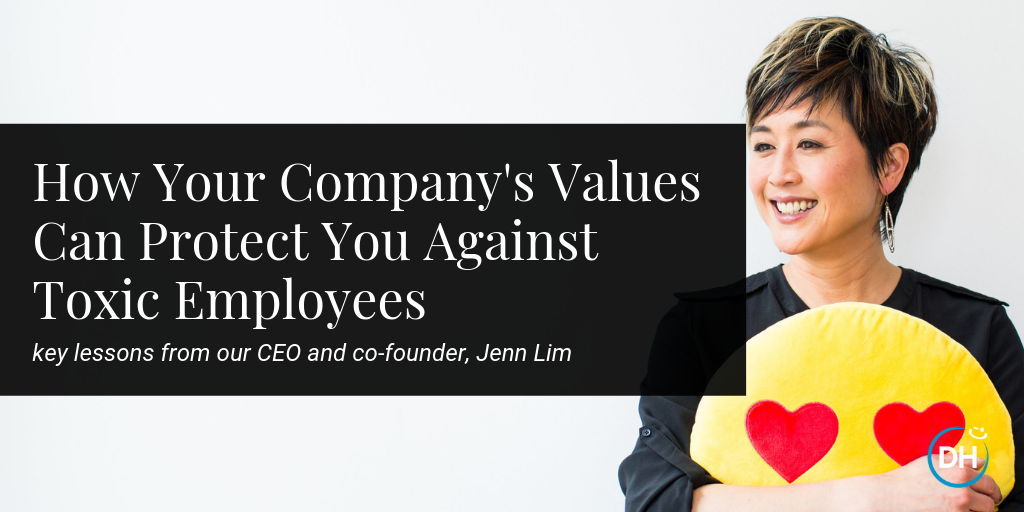
When it comes to challenges like funding, scaling, and profitability, creating your company's core values might be the last thing on your mind. But any values-based company I've been a part of would owe most of their success to their core values. So why is it that most companies don't give more attention to their values?
If you're a startup or in the very early stages of your business, here's why spending time on your values can help you avoid creating a toxic or unproductive work culture:
One common complaint I hear is that some leaders feel like they have to do 'everything' and make every decision for their team. It's this dance of wanting their teams to have more decision-making power and autonomy but being anxious about them making the wrong choice. In a startup environment, this probably sounds familiar. Even more familiar is the feeling that you have to constantly sacrifice time and energy to make every decision and see it through.
You might just think this behavior will only last in the startup phase, but it can extend further if you don't nip it sooner. Before they sought out my company, Delivering Happiness, for help with their company culture, Canpa was a 31-year-old business struggling with overwhelmed managers at every level -- from middle management all the way to the executive team. The Vice President, Murat Ozan, told me how it felt like he was "fighting every fire" and how difficult it was to delegate to his teams with confidence.
Does that sound familiar for anyone in your office?
When employees are tasked to uphold company values in business decisions, it makes it easier to trust that they will do what's right for the business. These values almost act as a compass, helping each individual to navigate both clear and murky work challenges. Knowing that your employees are making decisions based on the strategy and ethical standpoints of your business, you no longer have to feel like you're fighting every fire.
Related: From 30% Turnover to ZERO, Canpa's ROI of Culture [FREE CASE STUDY]
Your company's team may follow the adage, "one bad apple spoils the bunch." You may have the most talented engineers or project managers possible, but if they are difficult to work with, involved in misconduct, and are in opposition of your company's values, then your investment in them won't pay off in the long game. In fact, we know it will hurt to keep them around. Most notably it'll gouge your bottom line because you have to spend more to replace them and everyone else's productivity will decline.
If you've ever had a toxic or "bad apple" co-worker, you can recognize all the cons associated with them. When employees see their misaligned team members sticking around, potentially gaining favor from leadership, and (worse) even getting promoted, it is demoralizing to those that are living up to your values and actively looking out for the organization's culture. When this happens, that's when you start noticing other key team members becoming more disengaged, unproductive, and less proactive.
Not everyone is going to align with your company values, and that's okay. Here's an example of one of my favorite core values at Delivering Happiness: be true to your (weird) authentic self.
This value can be challenging to some people, especially if they are used to the traditional corporate workplace. And instead of pushing people to conform to our values, we just straight up ask them if they are aligned. It's as easy as saying, "These are our values. Are you willing to embrace them? And are you going to contribute to the culture, as well?"
If your team has employees who are completely not aligned with your values it's better to know sooner then later. Around the time of their $1.2 billion acquisition to Amazon, Zappos' CEO Tony Hsieh estimated a total loss of $100 million from not hiring people who were aligned with the company's culture and values. To avoid the same mistake, more companies are implementing a pay-to-quit model, offering new hires a sufficient sum of money to quit if they didn't feel the role or organization was the right fit. Last I heard, CNBC reported that Amazon was offering up to $10,000.
How much should you offer? Test it. If no one's taking the offer, dial it up. When you hit 3-5 percent of takers, you're in the right range.
If your organization's culture can financially benefit and scale with good people by putting core values to work, then why not give it a try? Use this advice to help form your hiring, growth, and management strategy for a happier, more productive workplace.
Let me know in the comments how it works in your organization!
Toxic workplaces can be detrimental to a businesses, both big and small. We have a People Systems Audit workshop that can help you identify ways to bring you closer to your ideal culture:
.jpeg)
Jenn Lim is the bestselling author of Beyond Happiness and has been named one of the World’s Top 50 Keynote Speakers. She’s had the privilege of leading a company to the Inc. 5000 Fastest Growing List, sitting on the Global Happiness Council of Work & Wellbeing, and working with hundreds of companies — from Fortune 500s and Best Places to Work to startups and governments. Her mission is both simple and profound: to teach businesses how to create workplaces—led with happiness and humanity—that generate more profit, sustain all people at every level of the organization, and share how we can make an impact by being true to our authentic selves. Jenn inspires folks around the world on ways to find meaning, grit, and joy, even in the toughest of times. She reminds us how we can all ripple an impact when we get real with ourselves first.